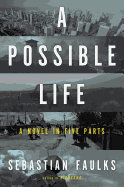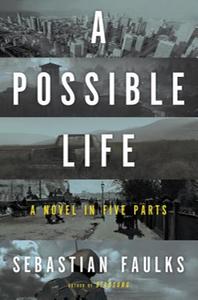
 Billed as a novel, Sebastian Faulks's A Possible Life is really five loosely connected stories or novellas, but in the grand scheme of things, connection--however fleeting--is precisely the point.
Billed as a novel, Sebastian Faulks's A Possible Life is really five loosely connected stories or novellas, but in the grand scheme of things, connection--however fleeting--is precisely the point.
Geoffrey, a young British schoolteacher taken prisoner in Poland during World War II, keeps his frightening reality at bay by imagining himself on a sunny English cricket pitch. When he is forced to shovel half-cremated bodies of babies, all such images disappear forever. His betrayal by the woman he loves adds to his despair. Putting his life back together begins with a simple act of kindness from a former student.
Billy is sent to the workhouse when he is seven years old in 1859 England; there are too many children and never enough to eat. "I wasn't alive. I was only breathing," he says of his experience. He marries a woman who is subsequently institutionalized, and her sister becomes a "wife" to him. They bear their impossibly difficult lives with dignity, taking solace in the comfort of each other. "And when I die all the memories of my own life will go to the grave with me," Billy says. "And that's what I've done for them, that's my gift to them."
Elena's story forms the centerpiece of the book. She is an Italian scientist in 2029 who discovers that "the defining quality of human consciousness, the thing that had given the world Leonardo, Mozart, and Shakespeare, and that had made humans little lower than the angels, was not an entity, but a connection... a voluntary self-awareness allowing its possessors to infer thought processes in others." This definition of what makes us human is abstract to be sure, but Faulks makes this "discovery" very important--giving new meaning to how we connect both with ourselves and with others.
Jeanne, an ignorant peasant girl in 1822 France, whose only and constant companion is religion, is read to from the Bible by her Master, and comes to understand parables that help her cope with her life. Finally, Anya is a Joan Baez type--a girl with a guitar and a stunning voice--in 1970s New York. She connects only with those things that give meaning to her life so she can turn them into songs.
These five stories are provocative meditations on love, loss, evil and what it means to be human, beautifully rendered by a prose master. --Valerie Ryan
Shelf Talker: Faulks (Birdsong) writes of five people and five different historical times in five disparate stories, subtly related thematically by the concept of "connection."

